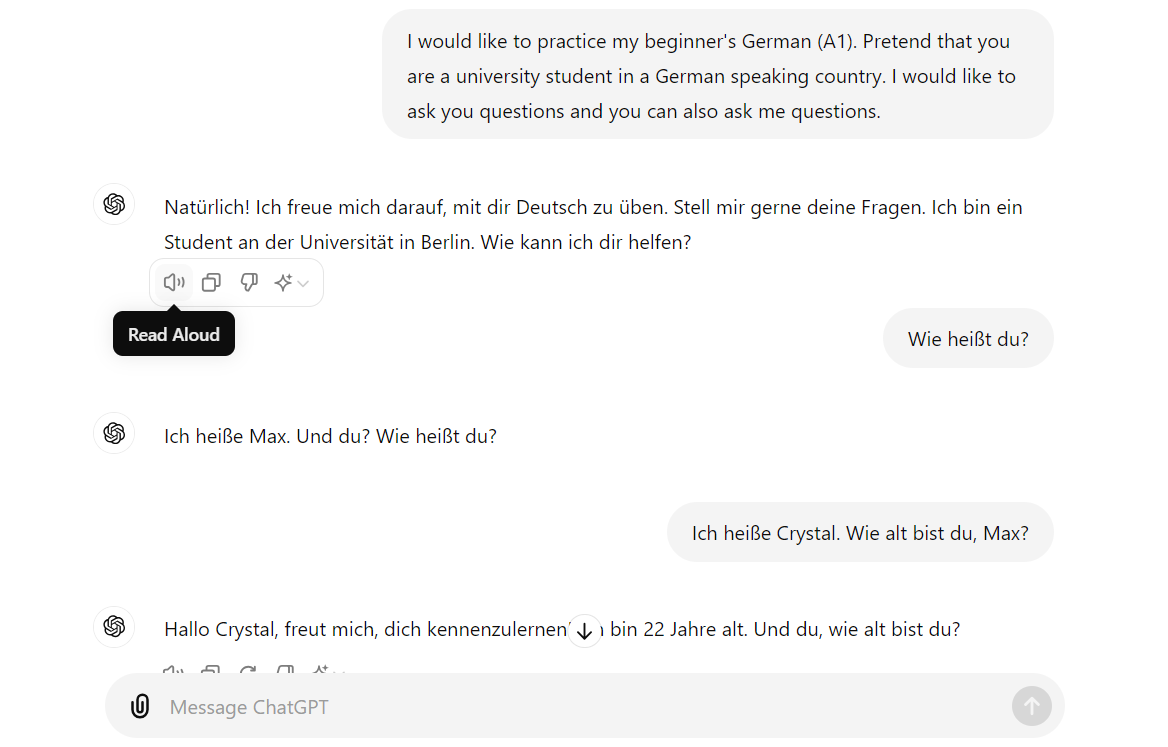Einheit 2.14 (online)
Gender-inclusive and gender-neutral language in German
In the past chapters, you have encountered a number of nouns that showed –in at the end. Many German nouns that refer to professions have a masculine form (referring to male people practicing that profession) and create the feminine form by adding –in (referring to female people practicing that profession). This also works for some nationalities. Here are some examples:
|
der Architekt – die Architektin der Pilot – die Pilotin der Manager – die Managerin der Krankenpfleger - die Krankenpflegerin der Politiker – die Politikerin
|
der Professor – die Professorin der Student – die Studentin der Lehrer – die Lehrerin der Schüler – die Schülerin der Partner – die Partnerin der Kanadier – die Kanadierin der Italiener – die Italienerin
|
In the past, the generic masculine form has often been used to not only indicate a male person practicing a specific profession but also for situations where the gender of the person was unknown or when talking in the plural about a group of people that also included women.
In order to achieve more gender equality in the language, various alternative forms of spelling were created, such as the internal capitalized i (StudentIn, einE StudentIn) or using both forms (Student und Studentin).
While these forms emphasize both feminine and masculine forms, they leave out diverse and nonbinary gender identities. Just like in the English language, several gender-inclusive forms were created for German, such as the gender-gap (Student_in, ein_e Student_in) or the gender-star (Student*in, ein*e Student*in).
With some words, a gender-neutral form is possible that derives from a verb participle or adjective, or is a synonym or an abstraction, for example: der/die Studierende.
In this beginning German textbook, we have opted to write out both feminine and masculine forms of nouns at first, because they are still the commonly used forms in the German-speaking countries. As we further progress through the book, we will start using gender-neutral forms like “Studierende” whenever possible.
![]() Vergessen Sie nicht!
Vergessen Sie nicht!
In Einheit 2.6 we learned all about telling time. We also learned about word order in expressions. Here are few more examples to help you remember the rules.
- time before place
- Ich reise im Sommer nach Deutschland.
- Um 22 Uhr singt Jan in einer Bar.
- Houssem geht heute Abend ins Konzert.
- general time before specific time
- Heute Nachmittag spiele ich um halb 3 Tennis.
- Am Montagabend fährt Luca um 18 Uhr im Park Rad.
- Andy sieht sonntags um Viertel nach 8 fern.
- Sebi lädt am Freitagabend um 21 Uhr Freunde ein.
- Lee hat am Montag um 11 Uhr Physik.
![]() Deutsch üben. Using ChatGPT copy and paste the prompt below. Practice asking and answering questions. Use the different features provided by ChatGPT to enhance your learning experience, such as the “read aloud” feature. If you do not have an account, you can sign up for free using your university account. You do not need to pay for any extra features or have the newest version.
Deutsch üben. Using ChatGPT copy and paste the prompt below. Practice asking and answering questions. Use the different features provided by ChatGPT to enhance your learning experience, such as the “read aloud” feature. If you do not have an account, you can sign up for free using your university account. You do not need to pay for any extra features or have the newest version.
Prompt: I would like to practice my beginner’s German (A1). Pretend that you are a university student in a German speaking country. I would like to ask you questions and you can also ask me questions.
Here is an example of what your conversation could start like:

![]() Wortschatz in Quizlet:
Wortschatz in Quizlet:
![]() Was wissen Sie jetzt? Klicken Sie hier für “Online Practice” 2.14.
Was wissen Sie jetzt? Klicken Sie hier für “Online Practice” 2.14.
![]() Quiz! Das Quiz ist in der nächsten Unterrichtsstunde.
Quiz! Das Quiz ist in der nächsten Unterrichtsstunde.
![]() Mini-Composition: Beschreibung einer Mitstudentin/eines Mitstudenten.
Mini-Composition: Beschreibung einer Mitstudentin/eines Mitstudenten.
Write a paragraph (at least 100 words) based on the information you obtained to describe the person you interviewed in the last class. Make sure to highlight vocabulary and concepts from this unit. This composition will be assessed according to this Rubric.
*Achtung*: since you will be describing a classmate it might be useful to use “his/her”. Just like we have been using “mein(e)/dein(e)” we use “ihr(e)” for her and “sein(e)” for his. You can review this in Einheit 2.4. If you don’t want to use these, but want to write about their phone number, major/minor, favourite colour, favourite class, etc., you could also use their name + s (no apostrophe in German).
- Silvia ist meine Freundin und ihre Telefonnummer ist 0761 494200.
- Mario fotografiert gern. Seine Lieblingsfarbe ist Grün.
- Paulas Lieblingskurs ist Wirtschaftspsychologie.
- Svens Hauptfach ist Politikwissenschaft und sein Nebenfach ist Germanistik.
Extra Practice (optional):
![]() Nicos Weg
Nicos Weg
Click on the link and watch the video. Then click on “start” under the video and do the exercises. There are two good options today:
Video 1 – “Describing the day”
Video 2 – “Free time activities”
Media Attributions
- information © IO-Images is licensed under a Public Domain license
- keyboard © IO-Images is licensed under a Public Domain license
- Beispiel ChatGPT © csawatzky is licensed under a CC BY-NC-SA (Attribution NonCommercial ShareAlike) license
- link © IO-Images is licensed under a Public Domain license
- check mark © janjf93 adapted by Solomon Hajramezan is licensed under a Public Domain license
- exclamation © IO-Images is licensed under a Public Domain license
- pen © IO-Images is licensed under a Public Domain license
- play © IO-Images is licensed under a Public Domain license
doctor
Kindergarten teacher
nurse

